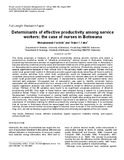Please use this identifier to cite or link to this item:
http://hdl.handle.net/10311/713| Title: | Determinants of effective productivity among service workers: the case of nurses in Botswana |
| Authors: | Forcheh, N. Fako, T. |
| Keywords: | Botswana nurses Effective productivity Logistic regression Midwifery training Peer-support Primary health care |
| Issue Date: | 2007 |
| Publisher: | Academic Journals, http://www.academicjournals.org |
| Citation: | Forcheh, N and Fako T (2007), Determinants of effective productivity among service workers: the case of nurses in Botswana, African Journal of Business Management, Vol. 1, No. 5, pp. 99-106 |
| Abstract: | The study proposes a measure of effective productivity among service workers and seeks a parsimonious predictive model of “effective productivity” among nurses in Botswana. Employee productivity has become a concern of organisations in all economic sectors world wide. In Botswana, it has also become a national priority issue and has been listed as one of the goals of the long term vision for Botswana due to perceived low productivity among the workforce. Productivity among nurses is of special significance because of their critical role in the primary health care system. Nurses working under local government control in Botswana provide a good case study since they all have to perform certain routine activities from which their productivity could be measured and compared. Self completed anonymous questionnaires were used to collect the relevant data from all health facilities under local government control in Botswana. A representative sample of 325 questionnaires were returned and analysed. Chi-squared test of association was used to identify univariate factors associated with effective productivity from among a list of 38 variables. Hierarchical stepwise multiple logistic regression analysis was used to identify a predictive model for effective productivity among nurses. Thirteen of the 38 variables were found to be significant univariate predictors of effective productivity (p<0.05). Only eight of these factors were retained during a search for a parsimonious predictive model. These in order of importance were midwifery training, involvement with the Village Development Committee, involvement in making health policies, peer support, religious affiliation, ability to complete the Botswana Obstetric Record, quality of health after posting and involvement with the community. The overall impact of these factors was found to be additive. The results underline the importance of midwifery training for effective productivity among nurses in Botswana. It is concluded that all nurses in Botswana should be encouraged and accorded the opportunity to do midwifery training. Nurses should further be encouraged to become more involved in the communities in which they work, as well as develop supportive relationships and a friendly atmosphere at the work place. |
| URI: | http://hdl.handle.net/10311/713 |
| ISSN: | 1993-8233 |
| Appears in Collections: | Research articles (Dept of Statistics) |
Files in This Item:
| File | Description | Size | Format | |
|---|---|---|---|---|
| Forcheh_AJBM_2007.pdf | 187.22 kB | Adobe PDF |  View/Open |
Items in DSpace are protected by copyright, with all rights reserved, unless otherwise indicated.
